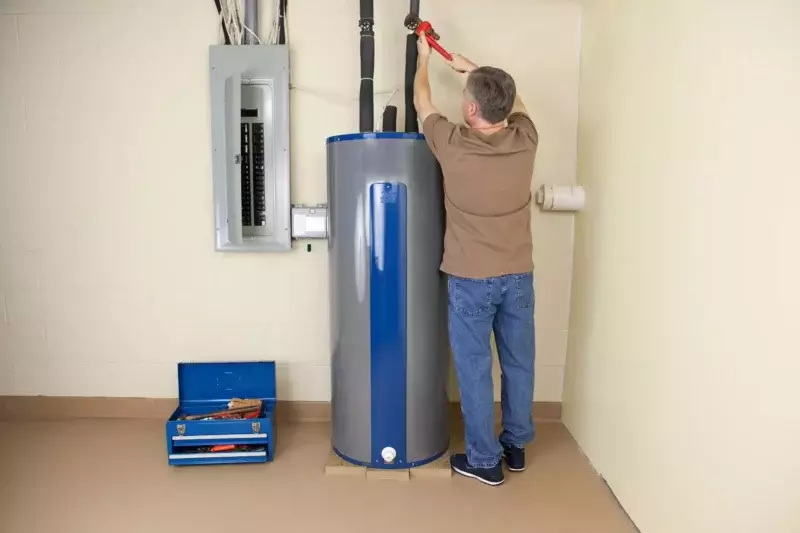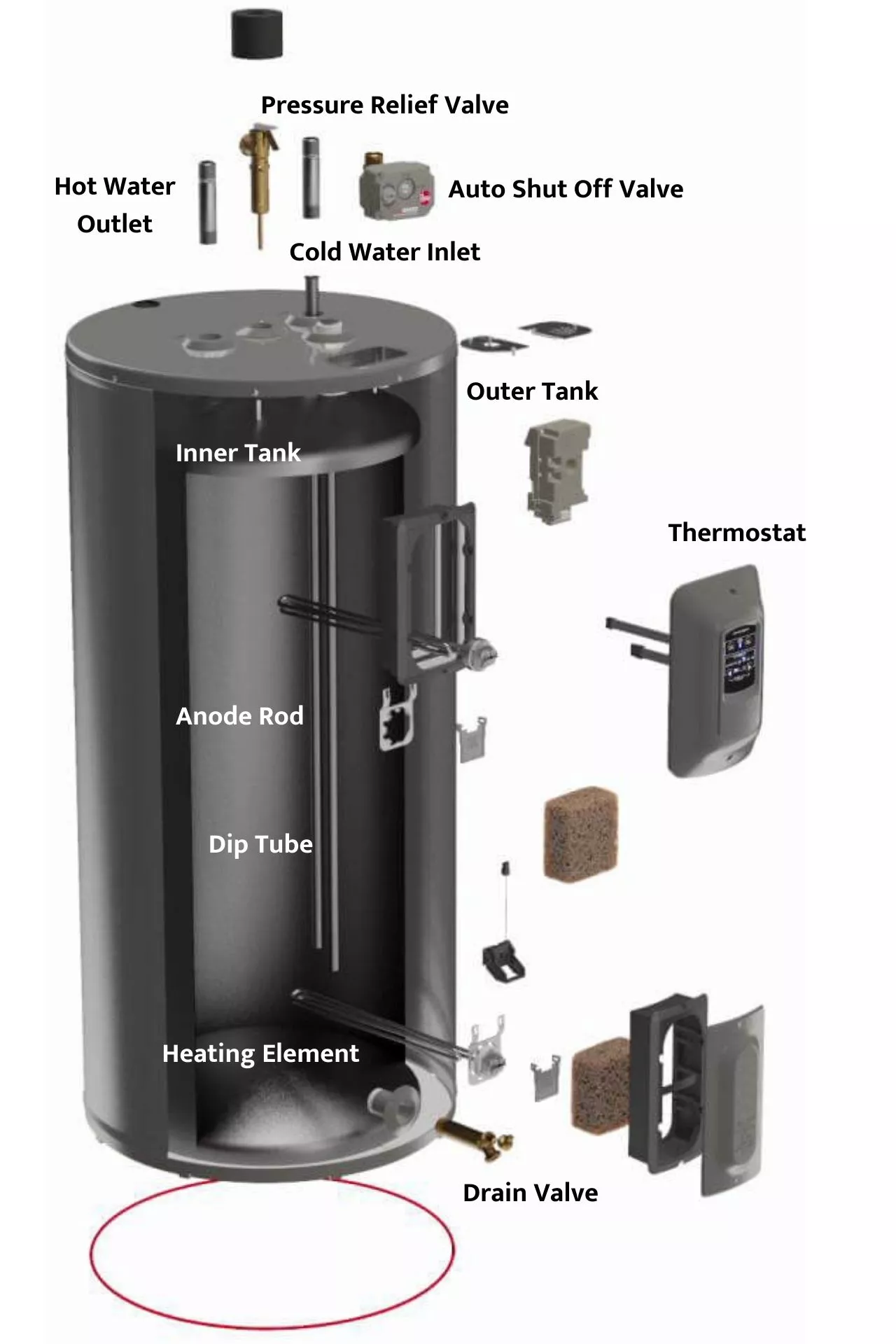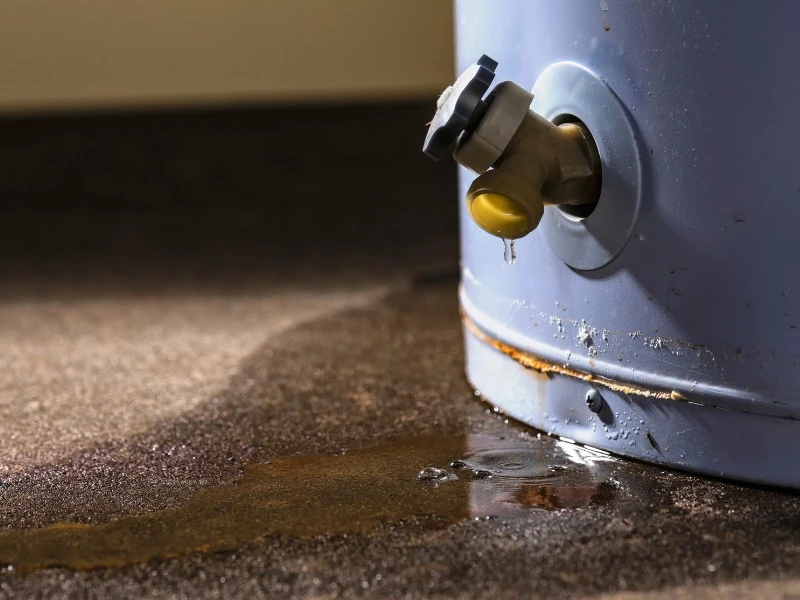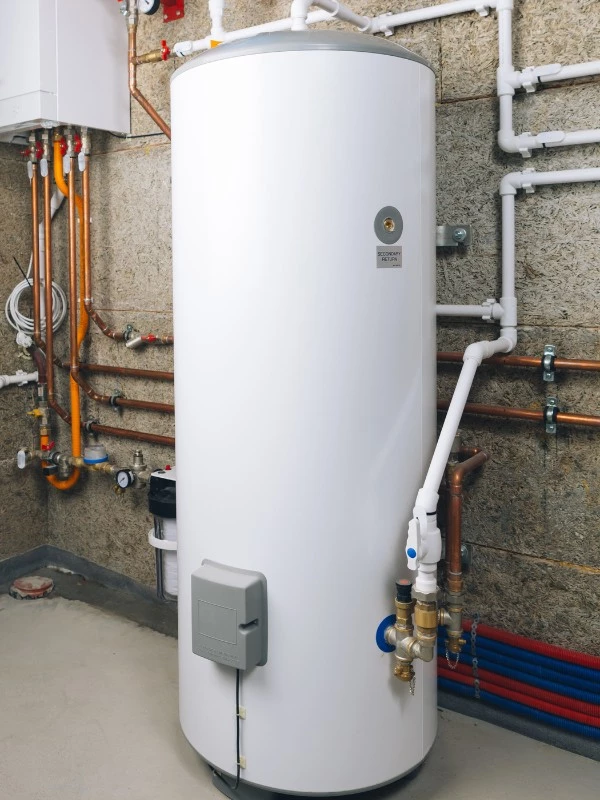[ad_1]
A leaking water heater can be a nightmare for any homeowner, leading to costly repairs and potential damage to your home. In this step-by-step guide, we’ll walk you through the process of identifying, fixing, and preventing water heater leaks.
By understanding the risks and taking appropriate action, you can safeguard your home from unpleasant surprises and costly repairs while prolonging the life of your water heater.
So, let’s get started on securing the safety and efficiency of your water heater!
Key Takeaways
- Immediate Response is Crucial: As soon as you notice a leak, it’s essential to act quickly. Shut off the water supply using the cold water shut-off valve and turn off the power supply to the water heater, whether it’s gas or electric, to prevent further damage and ensure safety.
- Identify the Leak Source: Conduct a thorough inspection of your water heater to locate the leak. Check the top for inlet and outlet connection issues, the side for temperature and pressure relief valve problems, and the bottom for drain valve leaks. Accurate diagnosis is key to effective repairs.
- Understand the Risks: Unaddressed water heater leaks can lead to significant home damage, including structural issues and mold growth. Awareness of these risks underscores the importance of prompt action and regular maintenance.
- Professional Help May Be Needed: For complex or severe leaks, or if you’re unsure about DIY repairs, seek professional assistance. Qualified plumbers can handle intricate issues like malfunctioning valves or electrical and gas problems.
- Preventive Maintenance is Essential: Regular maintenance, including annual inspections, anode rod checks, and tank flushing, can prevent future leaks and extend the lifespan of your water heater. These proactive steps are crucial for maintaining efficiency and avoiding costly repairs.

Acting swiftly when spotting a water heater leak is critical to reducing damage and potential risks. This guide will cover two steps: finding and using the shutoff valve and safely powering it down. These steps aid in controlling the situation and preparing for further inspection and repairs.
Locate and Use the Shutoff Valve
One of the first things you should do when you discover your water heater is leaking is to shut off the water supply.
To do this, locate the cold water shut-off valve or main water valve and turn it off. You can typically find the cold water shut-off valve near the top of your water heater, connected to the cold water inlet pipe. If the pipes are color-coded, look for the blue (cold) pipe. If not, simply touch the pipes to determine which one is cool to the touch.
Turning off the water supply is significant in preventing further damage and setting up a safe environment for inspecting and repairing the water heater.
Depending on the type of shutoff valve, you may need to turn a wheel, rotate a ball valve, or toggle a lever to the off position. If you’re unsure how to operate the valve, consult your water heater’s owner’s manual or seek guidance from a professional plumber.
Powering Down Safely
Once the water supply is off, deactivating the power supply to your water heater becomes the next important step. Doing so ensures your safety and prevents any further damage to the unit. The method for powering down your water heater depends on whether it’s a gas or electric model.
For electric water heaters, simply locate the circuit breaker connected to the electric water heater and flip it to the off position.
For gas heaters, you’ll need to shut off the gas valve by rotating it counterclockwise until it stops moving. By deactivating the power supply, you’re taking an essential step in safely addressing your water heater leak.
Pinpointing the Leak on Your Water Heater

With the water and power supply safely deactivated, the next step is to locate the source of the leak. A comprehensive inspection is needed as water heater leaks can occur at different locations. This guide will show you how to locate the leak by inspecting your water heater’s top, side, and bottom.
The guide will cover possible problems with inlets and valves (topside issues), pressure relief problems (side leaks), and drain valve issues (bottom leaks) to aid in accurate and efficient problem diagnosis.
Topside Troubles: Inlets and Valves
Start by inspecting the top of your water heater, where the inlet and outlet connections are located. These connections can become loose over time, leading to hot water heater leaking. Examine the cold and hot water inlets and the temperature and pressure (T&P) relief valve for any signs of leakage or damage.
If you find water leaking from the T&P valve, it could be due to elevated water pressure or a faulty valve. Ensure the temperature is not set too high.
This is important to prevent excessive pressure, which may cause the safety mechanism to be triggered. If the temperature is not the issue and the leakage persists, consult a professional to replace the valve.
Side Leaks: Pressure Relief Woes
Focus your attention on the side of your hot water heater. Check the temperature and pressure relief valve. This valve is a safety mechanism allowing steam or water to escape the hot water tank when excessive pressure builds up. Leaks from this valve can be due to a malfunctioning component or too much pressure inside the tank.
If the T&P valve is leaking, you may need to replace it. Before attempting any repairs, make sure the tank is depressurized to avoid potential hazards. If you’re unsure how to proceed, it’s always best to consult a professional plumber.
Bottom Drips: Drain Valve Dilemmas
Finally, inspect the bottom of your water heater, focusing on the drain valve. This valve near the bottom of the tank can become loose or damaged, leading to leaks. A leaking drain valve can be a problem. Carefully tighten it with a pipe wrench to solve the issue. If the leak persists, the valve may need to be replaced, especially if it’s corroded or damaged.
A comprehensive inspection of the top, side, and bottom of your water heater will enable you to determine the source of the leak and take the necessary action. Remember, don’t hesitate to seek guidance from a professional plumber when in doubt.
Understanding Water Heater Leak Risks

Water heater leaks can result in various potential risks and damage to your home and finances. Unnoticed or unaddressed water leaks that continue for prolonged periods can cause structural damage like warped flooring or damaged walls. Persistent moisture can also result in mold growth, posing health risks and causing more damage to your home.
Awareness of the risks associated with water heater leaks highlights the importance of prompt action and underscores the value of regular maintenance and inspections.
By staying vigilant and addressing any issues as they arise, you can protect your home and prolong the life of your water heater. Understanding when and why water heater leaks occur can help you take preventive measures.
Repair or Replace? Assessing Your Water Heater’s Condition
Determining whether your water heater requires repair or replacement can be challenging. Factors such as the leak’s age, condition, and severity play crucial roles in guiding your choice.
This guide will highlight when it might be appropriate to call professionals for assistance to help you decide on the best course of action for your water heater.
When to Call in the Professionals
Sometimes, a water heater leak may be too complex or severe for a DIY fix. In such cases, enlisting the help of a professional plumber can save you time, effort, and potential additional damage.
Common issues that warrant professional assistance include:
- malfunctioning T&P (temperature and pressure) valves
- incorrect water pressure
- blocked valves,
- electrical or gas problems.
When seeking a qualified professional, examine their credentials and references. Request evidence of insurance and licensing, and ensure they possess the necessary experience in dealing with water heater repairs.
By trusting your water heater to a skilled professional, you can have peace of mind knowing your home is in good hands.
Preventative Measures to Ward Off Future Water Heater Leaks

As the saying goes, “An ounce of prevention is worth a pound of cure.” By implementing regular maintenance and checks, you can prevent future water heater leaks and prolong the life of your unit.
This guide will cover the importance of regular maintenance checks, attention to the anode rod, and tank flushing to maintain the prime condition of your water heater.
An Ounce of Prevention: Regular Maintenance Checks
Scheduling routine inspections and maintenance is key to catching potential issues before they become major problems. Professional plumbers can inspect all plumbing components, including the water heater, for any existing leaks and assess each component to determine if they have the potential to cause future leaks. It’s recommended that water heaters be inspected for potential issues on an annual basis.
Although homeowners can execute regular water heater maintenance checks, hiring a professional plumber or heating technician for a detailed inspection and maintenance is often the optimal choice. This ensures that potential issues are spotted and addressed promptly, keeping your water heater in optimal condition.
The Protector of the Tank: Anode Rod Attention
The anode rod in your water heater plays a vital role in preventing corrosion and extending the life of your unit. This component attracts corrosion products, protecting the water heater from potential tank cracking. Replacing the anode rod promptly when necessary can help prevent leaks caused by this component.
Monitor the condition of your anode rod and replace it as needed to ensure your water heater remains in good working order. Timely attention to the anode rod can help prevent costly repairs and extend the life of your water heater, saving you both time and money in the long run.
Sediment Showdown: The Necessity of Flushing Your Tank
Flushing your water heater tank is an essential maintenance step to remove sediment buildup and improve efficiency. Over time, sediment can accumulate in the tank, leading to cracks and reduced efficiency. Flushing your tank at least once a year can prevent these issues and ensure your water heater operates smoothly.
Regular tank flushing offers several benefits for your water tank:
- Maintains the efficiency of your water heater
- Minimizes the risk of leaks and other potential issues
- Protects your home from water heater leaks
- Extends the life of your unit
Incorporating this simple maintenance task into your yearly routine is highly recommended.
Summary

In conclusion, addressing and preventing water heater leaks is an essential aspect of homeownership. By following our step-by-step guide, you can quickly identify and fix leaks, determine whether repair or replacement is necessary, and implement preventative measures to avoid future issues.
Regular maintenance, anode rod attention, and tank flushing can greatly prolong the life of your water heater and protect your home from potential damage.
Never underestimate the value of proactive maintenance and prompt action regarding water heater leaks.
By staying vigilant and addressing issues as they arise, you can enjoy the comfort and convenience of a well-functioning water heater for years to come.
Frequently Asked Questions
What should I do if my water heater is leaking?
Immediately turn off your water heater’s power supply and identify the source of the leak. Tighten any loose connections and consider replacing faulty valves. If the issue persists, contacting a professional plumber for assistance is best.
Can I still use the water heater if it is leaking?
It is not recommended to keep using a leaking water heater for the long term. You should immediately fix the tank to prevent further damage and turn off the appliance if the leak is significant.
How do I shut off the water supply to my leaking water heater?
Shut off the water supply to your water heater by turning off the cold water shut-off valve or main water valve near the top.
How often should I flush my water heater tank?
For optimal efficiency, it is recommended to flush your water heater tank at least once a year.
When should I consider replacing my water heater?
If your water heater is over 10 years old or requires frequent repairs, it is time to consider replacing it. Consult a professional for advice.
[ad_2]
Source_link


